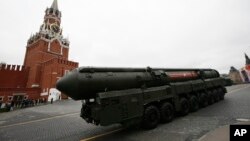NATO on Friday expressed concern that Russia was failing to comply with its last remaining nuclear arms control treaty with the United States.
As tensions soar over Russia's invasion of Ukraine, leading NATO power the United States has accused Moscow of not meeting its commitments under the decade-old New START pact.
On Tuesday, Washington slammed Russia for suspending inspections under the treaty and cancelling talks but did not accuse its Cold War rival of expanding its nuclear warhead arsenal beyond agreed limits.
"NATO allies agree the New START treaty contributes to international stability by constraining Russian and US strategic nuclear forces," the 30-strong alliance said in a statement.
"Therefore, we note with concern that Russia has failed to comply with legally binding obligations under the New START treaty."
NATO member states said they "call on Russia to fulfil its obligations" by allowing inspections and returning to talks.
Russia has hit back at Washington by accusing it of destroying weapons control agreements between the two countries.
Diplomacy between the two powers has ground to a bare minimum over the past year as the United States leads a drive to sanction Russia and arm Ukraine with billions of dollars in weapons.
Russian President Vladimir Putin has issued thinly veiled threats to use nuclear weapons, reviving Cold War era fears.
Moscow announced in early August that it was suspending U.S. inspections of its military sites under New START. It said it was responding to American obstruction of inspections by Russia, a charge denied by Washington.
The Kremlin then indefinitely postponed talks under New START that had been due to start on November 29 in Cairo, accusing the United States of "toxicity and animosity."
New START, signed by then President Barack Obama in 2010 when relations were warmer, restricted Russia and the United States to a maximum of 1,550 deployed strategic nuclear warheads each -- a reduction of nearly 30 percent from the previous limit set in 2002.
It also limits the number of launchers and heavy bombers to 800, still easily enough to destroy human life on Earth.




